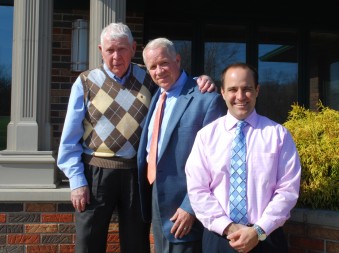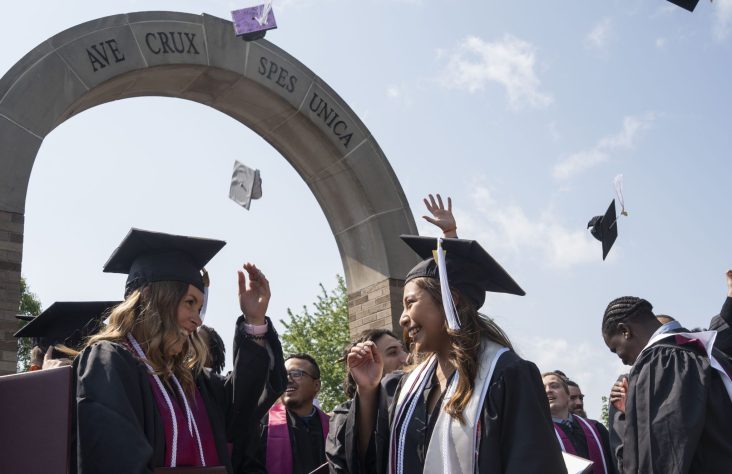June 10, 2014 // Local
Three generations of Catholic fathers
By Karen Clifford

Three generations of Klauer fathers, from left, include Roger F. Klauer, Roger G. Klauer and Daniel Klauer.
SOUTH BEND — With Father’s Day on June 15, Today’s Catholic sought the insight of three generations of Catholic fathers in the Klauer family. The eldest and youngest of the generations interviewed, Roger F. Klauer and Daniel G. Klauer, share the title of Doctor of Dental Surgery, with Roger G. Klauer holding both a Master of Divinity and Medical Doctor degree. Daniel and his father Roger Gerard are active in parishes within the Diocese of Fort Wayne-South Bend, while Roger Francis is a parishioner of the Archdiocese of Dubuque.
In the following question and answer, the three generations of Catholic men open up about the influences of faith, love and trust in molding their role as fathers.
Today’s Catholic: What is your definition of being a father?
Roger F. Klauer: A father first and foremost loves his wife, the mother of their children. It is a devoted relationship that does not break its promise to the children. A father, along with their mother must teach their children how to listen to their internal voice of truth. That voice can come in dreams, internal impulses to do the right thing, but most frequently in the voice of conscience, which is formed through and by the values the family has learned with the help of the Church, Scripture and traditions.
Today’s Catholic: What role does/did the Church play in helping you to be a father?
Roger G. Klauer: The Church taught me the value of reconciliation, inclusivity, human dignity, value of work, value of a preferential option to those in need, the value of mysticism. A mystic is someone who takes on the fullness of a Christian life and suffers the consequences of its reality in today’s world. The Church offered the mystery of the Trinity, the Incarnation, the name of God, I Am Who Am, as truths that if explored take you to a place that transcends yet includes reason. The Church is transfigurational, it shows the face of God, and yet is down to earth as it asks us to partake in the coming of a kingdom that is simultaneously already here and yet to come. Struggling to grasp these mysteries helped me raise my children, because the Church is one vehicle Christ used to raise us, the children of God.
Today’s Catholic: What characteristics did/do you admire in your father that helped you to be a better person and father for your children?
Daniel Klauer: I always admired the love and compassion my father showed us. He always said “I love you.” He always greeted us with a hug and a kiss no matter the venue. He always told us how proud he was. He always said the seemingly uncomfortable things that needed to be said. He encountered the awkward situations that needed to be discussed. I only hope that I have the courage, love and strength to embody this as I grow in being a father.
Today’s Catholic: Are there any family faith traditions that have been passed down to other generations?
Roger F. Klauer: The traditions that have been passed down include grace at meals. Saying the simple prayer, “Angel of God” any time we left one place to go to another. Saying our morning offering to dedicate our day to God upon first arising in the morning and then in my travel to work offering my work up to God. Evening prayers with our children and then kneeling at my bed saying my prayer, while at the same time my wife is saying her private prayers perhaps in the same room, or downstairs in the kitchen just before putting the finishing touches on a home before it goes to sleep. We blessed our children with hugs or pats on the head or a “God be with you” as they left the house, left the car or set out with friends.
Today’s Catholic: How does society as a whole benefit from a father’s presence in their children’s lives?
Roger G. Klauer: Society as a whole loses one half of the intelligence of its child rearing capacity if there is the absence of a father. Presence, the holy energy of the loving masculine proximity is a mysterious vital ingredient in the life of a child. The core family is wonderful, but it must be remembered that the core family was an innovation made necessary by the breakdown of something even greater, the core community. The absence of a father is a significant loss if society is made up of the core family unit, which is itself deteriorating. If we loved each other enough and if we learned to love the way others seem to have been called to love, then we could be a community that raises its children when they come from fathered or fatherless families.
Today’s Catholic: Do you have a special memory of a moment/event that you shared with your father?
Daniel Klauer: Two instances come to mind when I think of my father. Both were times when I disappointed him. One I was 10 years old and the other 19 years old. When it came time to discuss the disappointment he said nothing. He looked at me and said, “How do you feel?” I replied, “Terrible, I’m sorry, I have a pit in my stomach.” He simply replied, “Well good, I know that you’re sorry and that you learned from it.” Nothing more was to be spoken about. This love and trust was infectious. He could have belabored and gotten angry but he saw that I was truly sorry and realized there was nothing more to discuss. At the time this was almost worse than getting yelled at because the only thing worse than making your father mad is seeing your father disappointed. To this day I remember those two moments and reflect on how my father handled the situation. I admire his faith in knowing that we didn’t need to repeat the conversation over and over. We had an understanding that something went wrong and that we’d work hard to ensure it didn’t happen again.
The best news. Delivered to your inbox.
Subscribe to our mailing list today.






